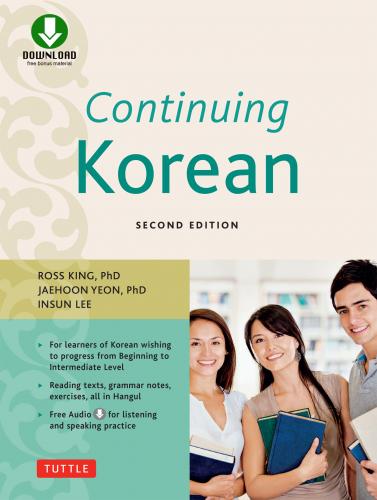Exercise 6: English to Korean Translation
Translate the following sentences into Korean.
| 1. | Don’t show Mother those magazines! |
| 2. | It’s raining, so let’s wait under that footbridge a while. |
| 3. | Have you tried [eating] Korean ginseng chicken soup? |
| 4. | Could you give me two 200-wǒn stamps, please? |
| 5. | Father had already left before Mr. Kim came. |
| 6. | I want to buy six 300-wǒn stamps. |
| 7. | Please give me 3 tickets at 10,000 wǒn. |
| 8. | Do you collect stamps? |
| 9. | Grandfather is lying down upstairs. |
| 10. | Would you wake him up [for me] first, please? |
| 11. | Could you send this letter to Korea [for me]? |
| 12. | Before I travelled in Europe, I hadn’t tried speaking any foreign languages. |
| 13. | This book is really difficult. Could you read it [for me], please? |
| 14. | Yesterday I bought a $2,000 computer. |
| 15. | Have you ever been to China? |
| 16. | I bought the tickets for tomorrow’s concert before we saw that movie. |
| 17. | I like listening to the radio. |
| 18. | We can’t go because there aren’t any tickets. |
| 19. | Mr. Lee’s nephew wants to travel in Europe. |
| 20. | He began to write that book last year, but hasn’t finished it yet. |
Exercise 7: Korean to English Translation
Translate the following sentences into English.
| 1. | 일본어 시험들은 너무 길고 어려워서, 낙제하기가 쉬워요. |
| 2. | 동생한테 소식이 없어서 어머니가 궁금해하세요. |
| 3. | 〔호텔에서〕이 요금에 아침도 포함돼 있습니까? |
| 4. | 수진: 아직도 빵과 콜라만 먹어요? |
| 토마스: 아니요, 요즘 한국 음식도 자주 먹기 시작했어요. | |
| 5. | 영진: 수진 씨, 시계가 너무 멋이 있어요! 생일 선물이에요? |
| 수진: 네, 아버지가 사 주셨어요. | |
| 6. | 〔리셉션 파티에서〕 |
| 진호: 음식이 맛이 있지요? | |
| 수진: 네, 그런데 의자가 없어서 먹기가 불편해요. | |
| 7. | 우리 7살짜리 아이는 드디어 학교에 다니기 시작했어요. |
| 8. | 현철: 중국말 배우기가 어때요? |
| 수미 : 말하기는 쉽지만, 읽고 쓰기는 아주 힘들지요. | |
| 9. | 〔차 안에서〕 |
| 철호: 어느 길이 더 빠를까요? | |
| 만호: 이쪽 길은 막히기가 쉬우니까, 저쪽 길로 갑시다. | |
| 10. | 내가 영어로 “헬로” 하니까 아이는 울기 시작했어요. |
| 11. | 철호: 왜 이렇게 늦을까요? 그 사람이 약속을 잘 지킵니까? |
| 수진: 네, 그런데 비 때문에 좀 늦을 거예요. | |
| 12. | 우리 16살짜리 아이는 요즘 운전을 배우기 시작했어요. |
| 13. | 철호: 10,000원만 빌려 주실래요? |
| 수진: 지난주에도 만원 빌려 줬잖아요?! | |
| 14. | 수진: 머리 스타일이 너무 예뻐요! 어디서 했어요? |
| 미나: 엄마 친구가 잘라 주셨어요. 멋있지요? |
Exercise 8: Vocabulary Drill
Here are a number of short sentences, each having a blank space. Express them in Korean —filling the blank each time with one of the expressions listed below the sentence.
| 1. | I’m glad that _____. a. my friend is coming b. my brother is getting married c. I’ve got a 약속 tomorrow d. it’s Sunday e. my mother isn’t busy now |
| 2. | Manho has on ______. a. a necktie b. glasses c. new shoes d. his hat e. new clothes |
| 3. | I walked ______. a. to the store b. in the park c. up to the third floor d. from the post office to the bank e. from home to school |
| 4. | Manho wants to ______. a. brush his teeth b. get a haircut c. wash his face d. wash his hair e. shave |
| 5. | Eric is trying on ______. a. some shoes b. his shirt c. gloves d. new clothes e. new glasses |
| 6. | 숙희_____ for me. a. looked after my children b. bought a hat c. waited two hours d. bought some tissues and towels e. posted the letter |
| 7. | Sangho _____ for my parents. a. bought a watch b. went to the bank and got some money c. called a cab d. filled in the lodging form |
| 8. | I’d like to _____. a. buy lots of hats b. sell my car c. go home now e. travel in Europe by train |
| Lesson 18 |
자동차는 어디서 빌릴 수 있습니까?
In this lesson we observe Eric discussing his health problems with his Korean teacher, and we watch Chris Murphy go through the procedure of renting a car at the hotel on Cheju Island. This lesson introduces some more new patterns built on the infinitive in -어 ~ -아, including the pattern for have to~ought to in -어 ~ -아야 돼요 and that for even though in -어 ~ -아도. These patterns are useful for expressing obligation and for asking and giving permission. The lesson also introduces another infinitive-based pattern, that in -어 + 지- for get/become . . . Finally, the lesson introduces can do and cannot do in -(으)ᄅ 수 있어요/없어요, the somewhat bookish conjunction (and) in -(으)며 and NOUN (을) 통해(서) through (the agency of) NOUN.
Korean Dialogues
Dialogue
